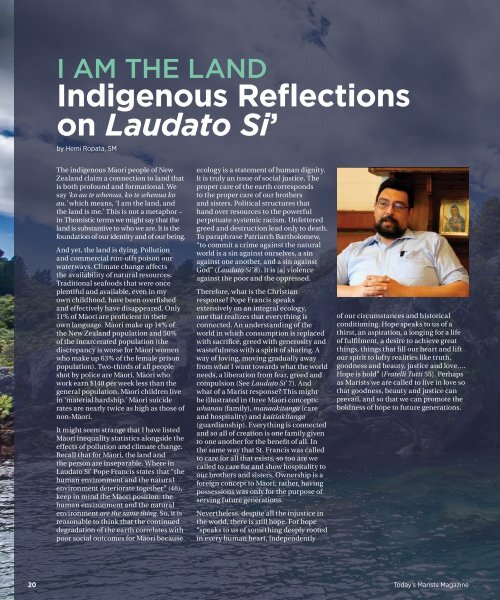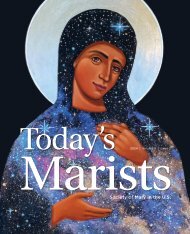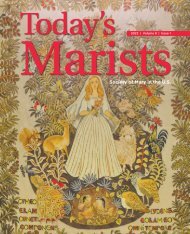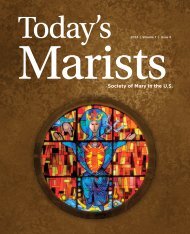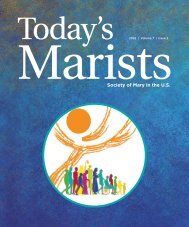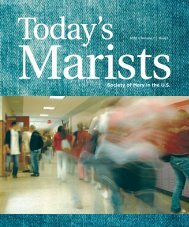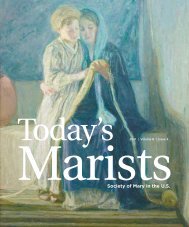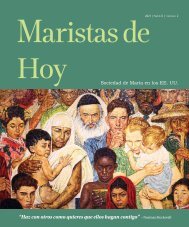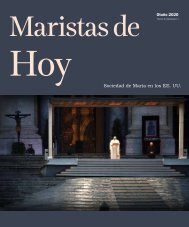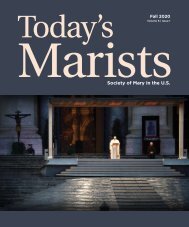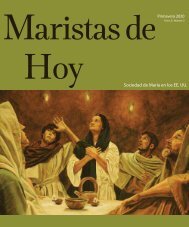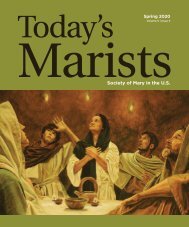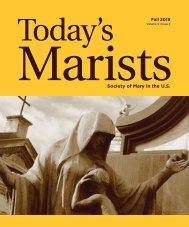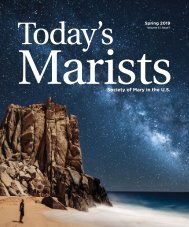Today's Marists Volume 6, Issue 2
- No tags were found...
You also want an ePaper? Increase the reach of your titles
YUMPU automatically turns print PDFs into web optimized ePapers that Google loves.
I AM THE LAND<br />
Indigenous Reflections<br />
on Laudato Si’<br />
by Hemi Ropata, SM<br />
The indigenous M – aori people of New<br />
Zealand claim a connection to land that<br />
is both profound and formational. We<br />
say ‘ko au te whenua, ko te whenua ko<br />
au.’ which means, ‘I am the land, and<br />
the land is me.’ This is not a metaphor –<br />
in Thomistic terms we might say that the<br />
land is substantive to who we are. It is the<br />
foundation of our identity and of our being.<br />
And yet, the land is dying. Pollution<br />
and commercial run-offs poison our<br />
waterways. Climate change affects<br />
the availability of natural resources.<br />
Traditional seafoods that were once<br />
plentiful and available, even in my<br />
own childhood, have been overfished<br />
and effectively have disappeared. Only<br />
11% of M – aori are proficient in their<br />
own language. M – aori make up 14% of<br />
the New Zealand population and 50%<br />
of the incarcerated population (the<br />
discrepancy is worse for M – aori women<br />
who make up 63% of the female prison<br />
population). Two-thirds of all people<br />
shot by police are M – aori. M – aori who<br />
work earn $140 per week less than the<br />
general population. M – aori children live<br />
in ‘material hardship.’ M – aori suicide<br />
rates are nearly twice as high as those of<br />
non-M – aori.<br />
It might seem strange that I have listed<br />
M – aori inequality statistics alongside the<br />
effects of pollution and climate change.<br />
Recall that for M – aori, the land and<br />
the person are inseparable. Where in<br />
Laudato Si’ Pope Francis states that “the<br />
human environment and the natural<br />
environment deteriorate together” (48),<br />
keep in mind the M – aori position: the<br />
human environment and the natural<br />
environment are the same thing. So, it is<br />
reasonable to think that the continued<br />
degradation of the earth correlates with<br />
poor social outcomes for M – aori because<br />
ecology is a statement of human dignity.<br />
It is truly an issue of social justice. The<br />
proper care of the earth corresponds<br />
to the proper care of our brothers<br />
and sisters. Political structures that<br />
hand over resources to the powerful<br />
perpetuate systemic racism. Unfettered<br />
greed and destruction lead only to death.<br />
To paraphrase Patriarch Bartholomew,<br />
“to commit a crime against the natural<br />
world is a sin against ourselves, a sin<br />
against one another, and a sin against<br />
God” (Laudato Si’ 8). It is [a] violence<br />
against the poor and the oppressed.<br />
Therefore, what is the Christian<br />
response? Pope Francis speaks<br />
extensively on an integral ecology,<br />
one that realizes that everything is<br />
connected. An understanding of the<br />
world in which consumption is replaced<br />
with sacrifice, greed with generosity and<br />
wastefulness with a spirit of sharing. A<br />
way of loving, moving gradually away<br />
from what I want towards what the world<br />
needs, a liberation from fear, greed and<br />
compulsion (See Laudato Si’ 7). And<br />
what of a Marist response? This might<br />
be illustrated in three M – aori concepts:<br />
whanau (family), manaakitanga (care<br />
and hospitality) and kaitiakitanga<br />
(guardianship). Everything is connected<br />
and so all of creation is one family given<br />
to one another for the benefit of all. In<br />
the same way that St. Francis was called<br />
to care for all that exists, so too are we<br />
called to care for and show hospitality to<br />
our brothers and sisters. Ownership is a<br />
foreign concept to M – aori; rather, having<br />
possessions was only for the purpose of<br />
serving future generations.<br />
Nevertheless, despite all the injustice in<br />
the world, there is still hope. For hope<br />
“speaks to us of something deeply rooted<br />
in every human heart, independently<br />
of our circumstances and historical<br />
conditioning. Hope speaks to us of a<br />
thirst, an aspiration, a longing for a life<br />
of fulfilment, a desire to achieve great<br />
things, things that fill our heart and lift<br />
our spirit to lofty realities like truth,<br />
goodness and beauty, justice and love….<br />
Hope is bold” (Fratelli Tutti 55). Perhaps<br />
as <strong>Marists</strong> we are called to live in love so<br />
that goodness, beauty and justice can<br />
prevail, and so that we can promote the<br />
boldness of hope to future generations.<br />
20 Today’s <strong>Marists</strong> Magazine


